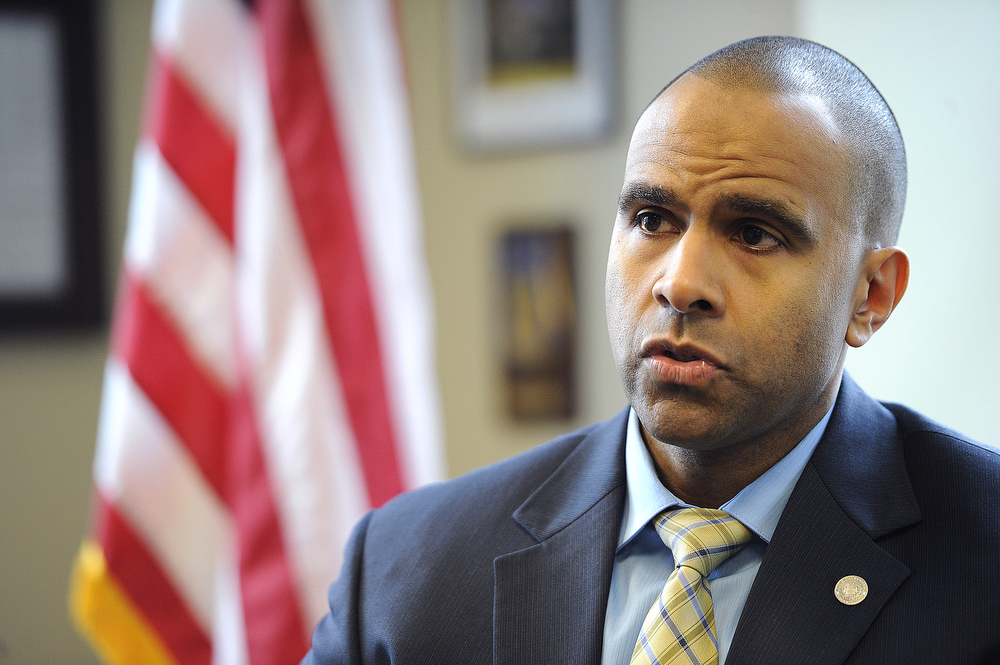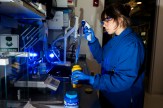NUPD chief: National shootings ‘disturbing,’ but present opportunity to form stronger bonds between police and communities

The nation is coming to grips with a string of tragic events last week, including police shootings of black men in Minnesota and Louisiana, and a peaceful protest in Dallas on Thursday night, where a sniper killed five officers and injured seven others, as well as two civilians. It was the deadliest day for U.S. law enforcement since Sept. 11.
Northeastern University Chief of Police Michael Davis has been a part of a range of efforts and initiatives at the national level examining law enforcement practices, particularly those involving race and policing. He served as a police practice consultant for the Department of Justice Civil Rights Division, and he’s also been involved with the DOJ’s Violence Reduction Network.
Here, he discusses the events of last week, and the road ahead in building stronger bonds between police and communities in America.
Given your work in this area on the national level, how do you view these recent events in Texas, Minnesota, and Louisiana with regard to race and policing?
It’s disturbing to me on multiple levels. When you see an event that is captured on camera that shows something that is difficult to look at and really casts doubt in the minds of many folks across the country about the essence of what we do as police officers, that’s disturbing.
This whole notion of policing is predicated on trust and the willful submission of people to the authority of police. When things occur that jeopardize that sense of trust, it’s damaging. It’s damaging to the relatedness we’re supposed to have between police and the community. It’s damaging within police departments. It’s damaging to our social fabric, and damaging to democracy. From my perspective, I’m trying to play a role in whatever way I can to help make this profession as effective as it ought to be.
As someone who has worn the uniform for 24 years the events in Dallas are difficult to comprehend. It’s hard to imagine what that department and community are going through. With all of these events occurring in such close proximity the danger is the potential to further polarize people on either one side or the other. The dynamic of isolation from and fear of each other is the antithesis of community and damaging to our democracy.
What is offered to us here is an opportunity. Every chance we have to examine incidents—and the goal is to reduce them and have them never happen again—is for us to understand what we can do to make this profession the best it can be. That centers on being effective, and being effective as a police department is really working on dealing with conditions that contribute to crime and disorder and bringing folks together within communities.
As an aside, that’s what this whole system of policing in this country is built on. That’s why we don’t have a national police force. It’s meant to be localized. The 18,000 police departments across this country are meant to deliver customized police service. That’s the most effective way to do it. I believe that.
The existence of so many police departments is conflated with the perpetual focus on the negative, which is why there are police organizations that we never hear about that are doing great things every day, knocking it out of the park every day, and that have stories that will never make the national news of the things they are doing to be additive to their communities. Of course, what we often see are the things that cast doubt on the efficacy of police.
But there is hope, obviously, and I have faith in the fact that folks will work toward having these moments be indicators of what we still have to work on, both as police departments and communities.
You mentioned that our national system of policing is based on a local police model that is able to give customized attention to a community. The incidents in Dallas, Baton Rouge, and Falcon Heights shape the national conversations on the relationships between police, communities, and race. Does the local nature of policing present challenges to addressing the issues and dialogues we’re seeing now on a national level?
That’s a great question. On the national level, as long as I’ve been involved, people have been calling for national standards—and there are. There are baseline national standards through the application of policing in a constitutional way. But that’s a minimum standard. If you look at policing reform and the most recent presidential task force on policing in the 21st century, there is plenty of information out there about how to do it right. There is also information that is produced through consent decrees from the DOJ that show pathways forward on setting up systems within organizations.
The same thing that presents an opportunity for people to be connected to policing is the same thing that presents a challenge when it comes to wholesale police reform. But that’s based on a set of assumptions that all police departments need to reform, or that the majority of police departments are not comporting to what is seen as a national standard.
The problem is that oftentimes the policing that happens in a community is reflective of the issues in that community. If there is a deep racial divide in a community, it’s hard for police departments to transcend that. And they ought to and need to—that’s their charge. It’s just the way the nation is—not in all places or even in most places, but in some places where we see problems.
There’s a lot of complexity here, but what needs to be the focus of any police department is defining what effective policing is for its jurisdiction, which means changing the conditions of relatedness both with and amongst community members. If you take on this different focus, things become a lot clearer to accomplish. How do members of a community relate to one another, and what is our role in creating the opportunity for folks to connect? Then we become part of that fabric—police playing our role—and that’s when you see great things happening. If you point to any major movement that has led to sustained lower levels of crime, higher levels of relatedness, you’ll find this approach.
Community building by its nature is the creation of something that didn’t exist. It is not the effort alone that matters but the outcomes. It is police leading the community to expand the collective sense of the whole, in other words, raise the level of collective efficacy.
If you think about the era of policing that we’re in, we’re still in a community policing era that began in the 1980s. I would say that we have evolved into what I call the community building era. The limiting factor of community policing is that it has often been reduced to programs, events, and meetings and hasn’t transformed policing—or communities for that matter. Community building by its nature is the creation of something that didn’t exist. It is not the effort alone that matters but the outcomes. It is police leading the community to expand the collective sense of the whole, in other words, raise the level of collective efficacy.
Minnesota’s governor has called for a federal investigation into the shooting death of Philando Castile. As someone who has been involved in a federal inquiry for the DOJ, how would such an investigation play out? What are the next steps?
There are several resources that can be offered by the federal government. The DOJ can come in and begin a preliminary investigation of pattern and practice and do a parallel investigation into the actions related to the individual events. They also can provide assistance, upon request, in a number of dimensions of police operations.
When people call up the DOJ, there is a menu of items. Sometimes the DOJ will come in and insert itself based on the situation and where the evidence leads, and sometimes it responds to the request and provides something other than the Civil Rights Division Service, such as the Community Oriented Policing Services, or COPS, within the DOJ.
To conclude, what else stands out when you think about the events of the past few days?
One of my colleagues once said that police are the only government entity that has house calls. We respond to everything that breaks down in society, and we feel the brunt of that. That’s our responsibility. Everyone else can walk away or not respond. When we respond to a call we’re charged with solving a problem.
The real issue is more societal, and I’ve seen it across the country, the breakdown of our social fabric. This is directly related to the work that police officers do. You can’t find an area of the country that is challenged with crime and disorder and not find a breakdown of the social fabric. It’s not just folks who live in those communities. The divide in this country that creates conditions for these things to occur is real. That’s what’s troubling, and that’s the work I see ahead.
The work I see is creating relatedness. That’s not some fluff term. That’s real.
The work I see is creating relatedness. That’s not some fluff term. That’s real. If you look at organizations and communities that thrive, there is a high degree of definable, measurable relatedness that we can point to. That’s the work I was involved in prior to coming to Northeastern—in Brooklyn Park, which is half diverse and 20 percent foreign born. We sought to build relatedness. It’s an intentional action that requires the people within the police department and throughout the structures of government. That’s the work.
These things sadden me because they spin into all kinds of different directions. There’s no doubt that we have to deal with the systemic practices of a police department and hold individuals accountable. To me that’s a foregone conclusion, and the system needs to make sure there is a line to ensure that happens justly. The question is what do we do in the wake of it. When the pundits are off TV and not talking about it, and the next issue comes up, what are the folks in these communities doing to bridge and build on their standing to create relatedness? It’s the responsibility of people in these communities, of government, of the private sector, and in particular the police departments to play a role in that.
Michael Davis has more than 24 years of experience in law enforcement. He was a police officer for 16 years with the city of Minneapolis, and was chief of police for the city of Brooklyn Park, Minnesota. He has received numerous awards and commendations for his service. Davis also serves as a police practice consultant for the Department of Justice Civil Rights Division and is currently the Strategic Site Liaison for the city of Detroit as part of the Violence Reduction Network. He has worked with the Police Executive Research Forum and was part of the Harvard Executive Session of Policing and Public Safety, which is through the National Institute of Justice.






